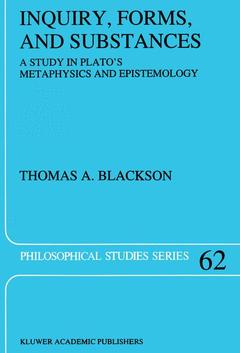Description
Inquiry, Forms, and Substances, Softcover reprint of the original 1st ed. 1995
A Study in Plato's Metaphysics and Epistemology
Philosophical Studies Series, Vol. 62
Author: Blackson Thomas
Language: English
Subject for Inquiry, Forms, and Substances:
Keywords
Aristotle; Heraclitus; Plato; Socrates; ancient philosophy; epistemology; knowledge; metaphysics; ontology; philosophy; sophists
Approximative price 105.49 €
In Print (Delivery period: 15 days).
Add to cart
Publication date: 10-2012
229 p. · 15.2x22.3 cm · Paperback
229 p. · 15.2x22.3 cm · Paperback
Description
/li>Contents
/li>
i. Introductory remarks 1 Plato, but not Socrates, concluded that the Forms are substances. Whether the Forms are substances is not an issue that Socrates had in mind. He did not deny it, but neither did he affirm it. If Socrates were asked a series of questions designed to determine whether he believed that the Forms are substances, he would admit that he had no opinion about this philosophical issue. Unlike Plato, Socrates was not a metaphysician. The same, of course, would not have always been true of Plato. Unlike Socrates, he was a metaphysician. At some point in his career, and at least by the time of the Phaedo and the Republic, Plato did what Socrates never thought to do. Plato considered the question and concluded that the Forms are substances. Although this development occurred more than two thousand years ago, time has not eclipsed its importance. It is one of the most seminal events in the history of the philosophy. With his defense of Socrates's method of intellectual inquiry, and the development of his Theory of Forms, Plato caused a now familiar cluster of metaphysical and epistemological issues to become central to philosophy.
1. Introduction.- i. Introductory remarks.- ii. Assumptions.- iii. Organization.- iv. Socrates’s influence.- v. Plato’s tribute to Socrates.- vi. Philosophers against lovers of spectacles.- vii. Heraclitean flux.- viii. Forms and the four kinds of stuff.- ix. Plato’s place in history.- 2. Plato’s Tribute to Socrates.- i. Introductory remarks.- ii. Socrates’s “What is F?” question.- iii. A new method of inquiry.- iv. Against Vlastos.- v. Against Annas.- vi. The Forms exist in a third realm.- vii. Forms and Recollection.- viii. Against Penner.- 3. Philosophers Against Lovers of Spectacles.- i. Introductory remarks.- ii. The Socratic challenge.- iii. An argument from knowledge.- iv. The lover of spectacles.- v. Against Owen.- vi. Against Vlastos.- vii. Against Irwin.- 4. Heraclitean Flux.- i. Introductory remarks.- ii. The Aristotelian explanation.- iii. Careless assimilation.- iv. Heraclitus and Protagoras.- v. Two mistakes.- vi. Forms are not “in” sensibles.- vii. Against traditional interpretations.- 5. Forms and the Four Kinds of Stuff.- i. Introductory remarks.- ii. Eternal Forms versus transitory sensibles.- iii. Starting-points in ontology.- iv. Against Cherniss.- v. Against Cornford.- vi. Against other interpretations.- vii. Against Frede.- 6. Conclusion.- i. Introductory remarks.- ii. The received wisdom.- iii. The development of Plato’s thought.- iv. Aristotle on Plato.- v. Illuminating a perplexing passage.- vi. Plato’s conception of reality.- Notes.
© 2024 LAVOISIER S.A.S.
These books may interest you

Socrates 67.68 €



